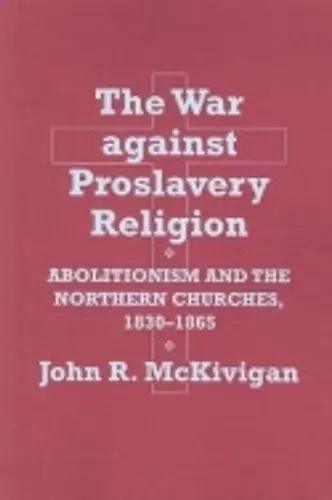The War against Proslavery Religion
Abolitionism and the Northern Churches, 1830–1865
Format:Paperback
Publisher:Cornell University Press
Published:3rd Sep '09
Currently unavailable, and unfortunately no date known when it will be back
This paperback is available in another edition too:
- Hardback£50.00(9780801415890)

Reflecting a prodigious amount of research in primary and secondary sources, this book examines the efforts of American abolitionists to bring northern religious institutions to the forefront of the antislavery movement.
John R. McKivigan employs both conventional and quantitative historical techniques to assess the positions adopted by various churches in the North during the growing conflict over slavery, and to analyze the stratagems adopted by American abolitionists during the 1840s and 1850s to persuade northern churches to condemn slavery and to endorse emancipation. Working for three decades to gain church support for their crusade, the abolitionists were the first to use many of the tactics of later generations of radicals and reformers who were also attempting to enlist conservative institutions in the struggle for social change.
To correct what he regards to be significant misperceptions concerning church-oriented abolitionism, McKivigan concentrates on the effects of the abolitionists' frequent failures, the division of their movement, and the changes in their attitudes and tactics in dealing with the churches. By examining the pre-Civil War schisms in the Presbyterian, Baptist, and Methodist denominations, he shows why northern religious bodies refused to embrace abolitionism even after the defection of most southern members. He concludes that despite significant antislavery action by a few small denominations, most American churches resisted committing themselves to abolitionist principles and programs before the Civil War.
In a period when attention is again being focused on the role of religious bodies in influencing efforts to solve America's social problems, this book is especially timely.
McKivigan shows that abolitionists, who were not infrequently clergymen themselves, found an enormous and nearly insurmountable challenge in their efforts to persuade formal church denominations to accept the idea that slavery was a sin and fellowship with slaveholders was not to be countenanced.... He addresses with logic and documentation the reasons why church leaderships held back from the abolitionist movement and why, during the early 1860s, it was won over to the abolitionist program. His book is eminently readable and his research admirable.
* Ohio History *This fine book has two central themes developed in tandem, more or less chronologically. One is the effort of abolitionists to covert clergymen and church people of the North to their cause. The other is the quarrel among leaders of these churches over endorsement of abolitionist goals such as the denunciation of slaveholding as a sin against God and the cessation of Christian fellowship with congregations including slaveholders.
* American Historical Review *This superbly researched and carefully written volume examines historical evidence of the relationship between the abolitionist movement and the northern churches in the middle years of the nineteenth century.... McKivigan presents evidence to support the thesis that the attitude of the northern religious community toward slavery prior to the Civil War was more ambiguous than has been supposed.... It will be regarded as the authoritative study of the topic.
* Choice *This well-researched and meticulously documented book thoroughly examines the efforts of abolitionists to convert American churches to their cause.... Historians have generally portrayed northern churches as being far in advance of public opinion in their antislavery views. Through extensive research in both manuscript and contemporary printed sources and judicious use of secondary literature, McKivigan has proven this to be a misperception of history. With few exceptions, the view of the northern churches on slavery was not far, if at all, in advance of the Republican party, and it certainly lagged far behind that of the abolitionists. Besides offering a new interpretation of an important aspect of antebellum history, this book provides a new perspective on the failure to ensure equal rights for the freedmen after the war.
* Journal of Southern HistoISBN: 9780801475764
Dimensions: 229mm x 152mm x 22mm
Weight: 907g
328 pages